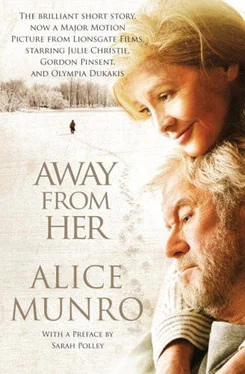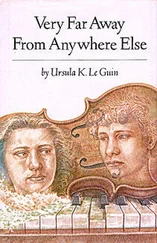“She’s a real lady,” Kristy said, in a tone so decisive and reassuring that Grant was not reassured. He had in his mind a picture of Fiona, in one of her long eyelet-trimmed blue-ribboned night-gowns, teasingly lifting the covers of an old man’s bed.
“Well, I sometimes wonder—” he said.
Kristy said sharply, “You wonder what?”
“I wonder whether she isn’t putting on some kind of a charade.”
“A what?” said Kristy.
Most afternoons the pair could be found at the card table. Aubrey had large, thick-fingered hands. It was difficult for him to manage his cards. Fiona shuffled and dealt for him and sometimes moved quickly to straighten a card that seemed to be slipping from his grasp. Grant would watch from across the room her darting move and quick, laughing apology. He could see Aubrey’s husbandly frown as a wisp of her hair touched his cheek. Aubrey preferred to ignore her as long as she stayed close.
But let her smile her greeting at Grant, let her push back her chair and get up to offer him tea—showing that she had accepted his right to be there and possibly felt a slight responsibility for him—and Aubrey’s face took on its look of somber consternation. He would let the cards slide from his fingers and fall on the floor, to spoil the game.
So that Fiona had to get busy and put things right.
If they weren’t at the bridge table they might be walking along the halls, Aubrey hanging on to the railing with one hand and clutching Fiona’s arm or shoulder with the other. The nurses thought that it was a marvel, the way she had got him out of his wheelchair. Though for longer trips—to the conservatory at one end of the building or the television room at the other—the wheelchair was called for.
The television seemed to be always turned to the sports channel and Aubrey would watch any sport, but his favorite appeared to be golf. Grant didn’t mind watching that with them. He sat down a few chairs away. On the large screen a small group of spectators and commentators followed the players around the peaceful green, and at appropriate moments broke into a formal sort of applause. But there was silence everywhere as the player made his swing and the ball took its lonely, appointed journey across the sky. Aubrey and Fiona and Grant and possibly others sat and held their breaths, and then Aubrey’s breath broke out first, expressing satisfaction or disappointment. Fiona’s chimed in on the same note a moment later.
In the conservatory there was no such silence. The pair found themselves a seat among the most lush and thick and tropical-looking plants—a bower, if you like—which Grant had just enough self-control to keep from penetrating. Mixed in with the rustle of the leaves and the sound of splashing water was Fiona’s soft talk and her laughter.
Then some sort of chortle. Which of them could it be?
Perhaps neither—perhaps it came from one of the impudent flashy-looking birds who inhabited the corner cages.
Aubrey could talk, though his voice probably didn’t sound the way it used to. He seemed to say something now—a couple of thick syllables. Take care. He’s here. My love.
On the blue bottom of the fountain’s pool lay some wishing coins. Grant had never seen anybody actually throwing money in. He stared at these nickels and dimes and quarters, wondering if they had been glued to the tiles—another feature of the building’s encouraging decoration.
Teenagers at the baseball game, sitting at the top of the bleachers out of the way of the boy’s friends. A couple of inches of bare wood between them, darkness falling, quick chill of the evening late in the summer. The skittering of their hands, the shift of haunches, eyes never lifted from the field. He’ll take off his jacket, if he’s wearing one, to lay it around her narrow shoulders. Underneath it he can pull her closer to him, press his spread fingers into her soft arm.
Not like today when any kid would probably be into her pants on the first date.
Fiona’s skinny soft arm. Teenage lust astonishing her and flashing along all the nerves of her tender new body, as the night thickens beyond the lighted dust of the game.
Meadowlake was short on mirrors, so he did not have to catch sight of himself stalking and prowling. But every once in a while it came to him how foolish and pathetic and perhaps unhinged he must look, trailing around after Fiona and Aubrey. And having no luck in confronting her, or him. Less and less sure of what right he had to be on the scene but unable to withdraw. Even at home, while he worked at his desk or cleaned up the house or shoveled snow when necessary, some ticking metronome in his mind was fixed on Meadowlake, on his next visit. Sometimes he seemed to himself like a mulish boy conducting a hopeless courtship, sometimes like one of those wretches who follow celebrated women through the streets, convinced that one day these women will turn around and recognize their love.
He made a great effort, and cut his visits down to Wednesdays and Saturdays. Also he set himself to observing other things about the place, as if he was a sort of visitor at large, a person doing an inspection or a social study.
Saturdays had a holiday bustle and tension. Families arrived in clusters. Mothers were usually in charge, they were like cheerful but insistent sheepdogs herding the men and children. Only the smallest children were without apprehension. They noticed right away the green and white squares on the hall floors and picked one color to walk on, the other to jump over. The bolder ones might try to hitch rides on the back of wheelchairs. Some persisted in these tricks in spite of scolding, and had to be removed to the car. And how happily, then, how readily, some older child or father volunteered to do the removing, and thus opt out of the visit.
It was the women who kept the conversation afloat. Men seemed cowed by the situation, teenagers affronted. Those being visited rode in a wheelchair or stumped along with a cane, or walked stiffly, unaided, at the procession’s head, proud of the turnout but somewhat blank-eyed, or desperately babbling, under the stress of it. And now surrounded by a variety of outsiders these insiders did not look like such regular people after all. Female chins might have had their bristles shaved to the roots and bad eyes might be hidden by patches or dark lenses, inappropriate utterances might be controlled by medication, but some glaze remained, a haunted rigidity—as if people were content to become memories of themselves, final photographs.
Grant understood better now how Mr. Farquar must have felt. People here—even the ones who did not participate in any activities but sat around watching the doors or looking out the windows—were living a busy life in their heads (not to mention the life of their bodies, the portentous shifts in their bowels, the stabs and twinges everywhere along the line), and that was a life that in most cases could not very well be described or alluded to in front of visitors. All they could do was wheel or somehow propel themselves about and hope to come up with something that could be displayed or talked about.
There was the conservatory to be shown off, and the big television screen. Fathers thought that was really something. Mothers said the ferns were gorgeous. Soon everybody sat down around the little tables and ate ice cream—refused only by the teenagers, who were dying of disgust. Women wiped away the dribble from shivery old chins and men looked the other way.
There must be some satisfaction in this ritual, and perhaps even the teenagers would be glad, one day, that they had come. Grant was no expert on families.
No children or grandchildren appeared to visit Aubrey, and since they could not play cards—the tables being taken over for the ice cream parties—he and Fiona stayed clear of the Saturday parade. The conservatory was far too popular then for any of their intimate conversations.
Читать дальше











